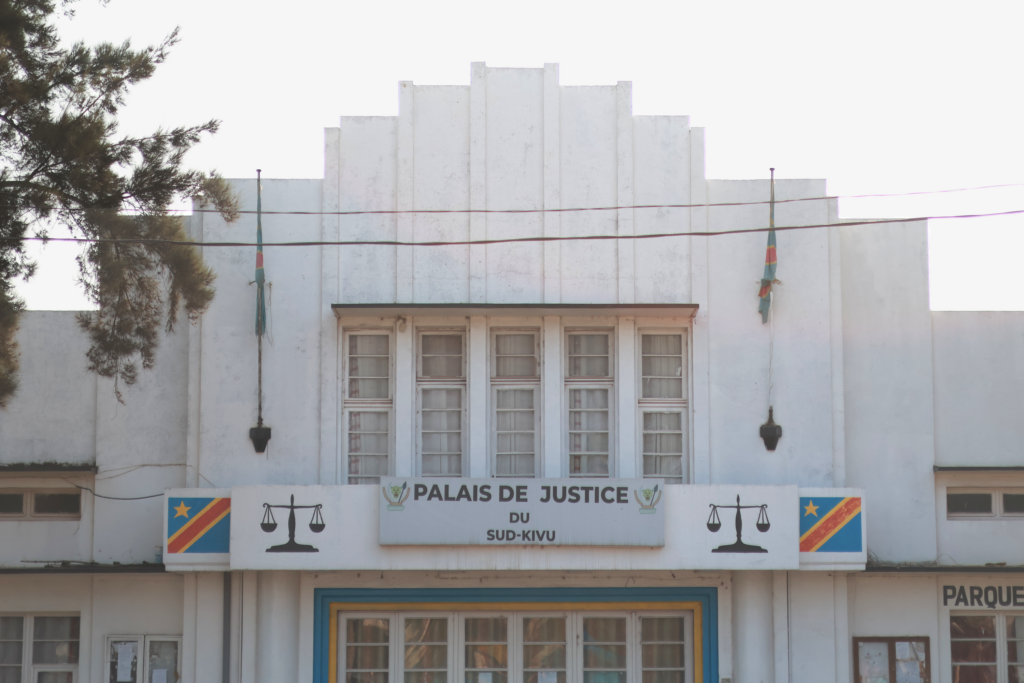The leader of a coalition of armed groups in the DRC convicted of crimes against humanity
Donat Kwenga Omari, a former soldier in the national army (FARDC), has been convicted by the Bukavu Garrison Military Court of crimes against humanity committed when he was leader of a coalition of dozens of Raia Mutomboki armed groups known as the “Forces Populaires de Paix”. Although the trial shed light on Donat’s role in the atrocities committed by this coalition, TRIAL International deplores the recourse to the death penalty.

Donat Kwenga Omari, a former soldier in the national army (FARDC), has been convicted by the Bukavu Garrison Military Court of crimes against humanity committed when he was leader of a coalition of dozens of Raia Mutomboki armed groups known as the “Forces Populaires de Paix”. Although the trial shed light on Donat’s role in the atrocities committed by this coalition, TRIAL International deplores the recourse to the death penalty.
Following mobile court hearings, Donat was found guilty of the crimes of rape, sexual slavery, murder, torture, deprivation of liberty, enforced disappearance and other inhumane acts as crimes against humanity, perpetrated between 2016 to 2021. Mobile court hearings were held in the territories of Shabunda and Kalehe (South Kivu province), as close as possible to the victims’ villages of origin and the places where the crimes were committed.
Reparations were awarded to over 300 victims who participated in the trial as civil parties. The Court granted specific rehabilitation measures for victims of rape and torture.
“The trial gave a voice to the victims and established the scale and seriousness of the crimes committed under Donat’s leadership in the province of South Kivu over a number of years,” emphasizes Daniele Perissi, DRC Program Manager. “However, we regret the recourse to the death penalty as a punishment, all the more so in the current context of the lifting of its moratorium. We remind the Congolese authorities that the death penalty is incompatible with the right to human dignity, the right to life and the prohibition of torture and other cruel, inhumane or degrading treatment or punishment.”
A former major in the national army, Donat had deserted to create his own armed group in 2012, and then chaired a coalition of Raia Mutomboki (RM) armed groups called “Forces Populaires de Paix”. In recent years, other RM leaders who gravitated around him have been sentenced by the Congolese justice system, including Kokodikoko in 2019, Hamakombo in 2020, and Bralima and Ndarumanga in 2023. This verdict represents a major step in the punishment of these groups, which have been operating in South Kivu province for over ten years.
RM militias, or “angry citizens” in Swahili, are local self-defense movements that have structured themselves into armed groups and operated in the province of South Kivu. These groups began to develop in 2011 in response to attacks on the population by the Rwandan militia FDLR (Forces Démocratiques pour la Libération du Rwanda), facilitated by a security vacuum. They then took control of certain portions of the province’s territory, launching attacks against the civilian population.
TRIAL International supported the Congolese NGOs who provided awareness-raising and assistance to the victims so that they could participate in the trial and coordinated the work of the collective of lawyers who represented the victims throughout the legal proceedings.
TRIAL International’s work on this case is carried out within the framework of the South Kivu International Criminal Justice Task Force, an informal network of international actors working together to support the work of Congolese courts in investigating and prosecuting mass crimes in the DRC.


